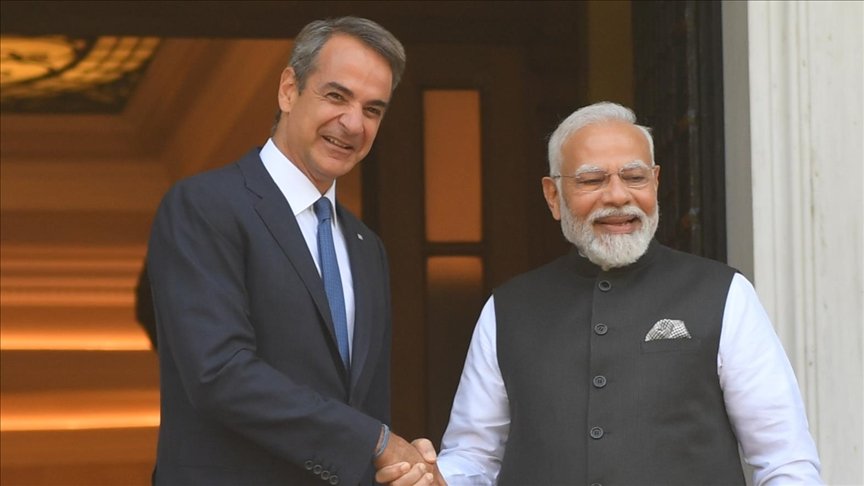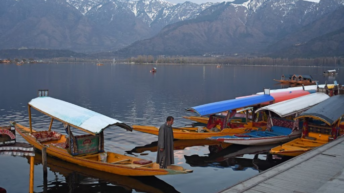|
Listen to article
Getting your Trinity Audio player ready...
|

Indo-Pacific and EU
Prime Minister Kyriakos Mitsotakis of Greece was the chief guest at the Raisina Dialogue on 24 February 2024. Exchange visits of high dignitaries of India and Greece speak of widening relations between them. It also is an indication of Athens’ growing interest in the Indo-Pacific region.
The strategic and commercial importance of the Indo-Pacific region has been under focus of world powers. The Quad and AUKUS, both, with strategic undertones, are the result of the heightened importance attached to the region.
China considers both as hostile acts against her. But Beijing will not say how her warships have been roaming threateningly in Indo-Pacific waters and how her spy ships have been regularly docking at various strategic harbours of adjoining countries despite objections raised by them.
It is to be noted that of late several European countries have demonstrated eagerness to play an active role in the Indo-Pacific. In its document ‘Indo-Pacific Strategy,’ the European Union carried its public position on the subject spearheaded by France, Germany and the Netherlands. This indicated a change in the perception of the European Union.
The first indication of changed perception came from Italy. In an article ‘Italy’s pivot to the Indo-Pacific …’ published in the Instituto Affari Internazional, the author wrote, “Italy is stepping up its involvement in the Indo-Pacific, both in the economic and security realms. The cabinet led by Giorgia Melolni—a centre-right coalition often portrayed by commentators as right-wing and nationalist- is rebalancing Rome’s policy in the Far East by scaling down ties with Beijing and by effectively lending support to the United States and its Allies vis-a-vis an increasingly assertive and self-confident China. Moving away from previous centre-left governments, the conservative coalition in power since September 2022 has been fostering defence related cooperation with Japan and India…”
Greece
Greece is the latest member of the EU to have evinced interest in the Indo-Pacific. It indicates deviation from her traditional policy of little interest in the Indian Ocean Region (IOR) and the peripheries. Analysis shows that Greece holds great potential for becoming involved in the Indo-Pacific strategies.
Within the EU countries, Greece has the longest coastline which Greece has effectively utilized and emerged as the world’s largest ship-owning nation. The Diplomat of 24 February wrote, “Currently, shipping contributes an impressive 8 percent of the country’s GDP. Not only does Greece actively participate in international maritime security initiatives such as EUNAVFOR ATALANTA, but it also plays an instrumental role in shaping the EU’s maritime security agenda. It was under the Greek presidency that the EU adopted the EU Maritime Strategy in 2014.”
Greece is a strong naval force in the EU, with 11 submarines, 3 frigates, three mine/countermine warfare ships, and 36 offshore patrol units as of November 2023. In its edition of February 25, Aljazeera wrote, “Greek opposition parties have joined the government in approving the country’s biggest naval modernisation in 20 years. Over the next four years, Greece will spend 2.26 bn Euros ($2.53 bn) buying three Belharra frigates built by France’s Naval Group, considered state of the art in the Western arsenal. Over the next year, Greece is expected to increase the order to four frigates and four corvettes to accompany them.”
India in Athens’ chemistry

We have to note that the European Union’s Red Sea mission, Operation Aspides, is headed by Greece with the operational command centre based in Larissa. Athens’ interest in the Indo-Pacific is linked to its desire to emerge as a bridge between Europe and Asia. Obviously, for Greece, India has significance because it provides the key entry point into Asia. Therefore, her closer ties with India are essential particularly when Greece’s influence in the Asiatic region is limited.
Prime Minister Modi visited Greece last August. Both sides “shared their vision of a free, open and rules-based Mediterranean Sea and Indo–Pacific.” After the visit, in an op-ed for an Indian daily, Greek Prime Minister Kyriakos Mitsotakis, in the context of growing defence and security ties with India, announced that the Hellenic Air Force and Navy would soon be present in the Indo-Pacific, reported the Diplomat.
Prime Minister Mitsotakis made a state visit to India on February 21-22 during which he also served as the chief guest and delivered the keynote address at the Raisina Dialogue, India’s flagship conference on geopolitics and geostrategy. India is an important member of Quad. Greece’s strategic association with the Indo-Pacific gives more strength to India’s security perception of the region. With Greece set to host the Our Ocean Conference in April this year, there is a fair chance of Athens expanding cooperation with Indo-Pacific countries.
The indication is that Athens does not want to lag behind other important powers that are evincing keen interest in the Indo-Pacific. What adds to the urge of Greece to be more participative in the affairs of the region is the contemplated project of the India-Middle East-Europe Economic Corridor. Greece would like to play the role of an important factor in shaping the regional connectivity agenda.
Turkey’s role
Should Greece claim the full 12 nautical miles of territorial water allowed under the UN Convention on the Law of the Sea, Turkey will be in dire straits. This would give Greece ownership of 71.5 percent of the Aegean Sea. Last year, Turkish military vessels and jets carried out 2,085 violations of Greek territorial water and 2,459 violations of its national aerospace. ”Turkish air patrols along the 25th meridian (in the middle of the Aegean) are a big risk. Our national airspace and territory have become a field of hostile actions,” said opposition MP, Sofia Sakorafa in the Greek parliament.
Turkey disagrees with the UN law on the rights of Greece’s islands and went a step further disputing Greece’s sovereignty over its islands in the east Aegean. Turkey is increasing its naval power which is a threat to Greece. All this makes it necessary for Greece to take necessary military and political measures that would ensure her security. Turkey, as we know, is aspiring for the leadership of the Islamic Caliphate which is far beyond the revival of Ottoman grandeur. In the process, Turkey has adopted an anti-India stance on the Kashmir dispute and has been making anti-India interventions at the UN. Chagrined at the Indian proposal of a Middle East transit route to Europe, Turkey has recently come out with the idea of a parallel route connecting Azerbaijan with Europe.
Conclusion
India strongly supports the involvement of Greece in the Indo-Pacific strategies. India understands that Greece’s participation will lend support to the security of the region against authoritarian elements that are not prepared to concede the right of free navigation in the Indian Ocean region. Greece has become a significant link in India-sponsored Middle East connectivity. It means that trade and commerce in the region will increase considerably and will contribute to the economic development of the nations through which the corridor will pass.






Add comment